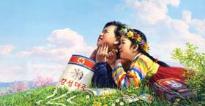Amid Hardship, North Korean Leaders Hold On
 The New York Times reports:
The New York Times reports:
SEOUL, South Korea — As military and political tensions persist on the Korean Peninsula, North Korea is trudging through another winter of shortages, bitter cold, not much food and precious little fuel.
A recent report from the North described the longest stretch of subzero temperatures since 1945. A number of countries and international aid groups have reported desperate appeals from the government in Pyongyang for humanitarian food aid in the past few weeks. And an epidemic of foot and mouth disease has infected more than 10,000 cows, pigs and draft animals.
But even in the face of such hardships, analysts said, the Communist government showed no sign of relaxing its political grip or opening up its economy beyond agreeing to some joint ventures with China and allowing some private traders to operate.
“Reforms mean death,” said Andrei Lankov, a North Korea expert and professor at Kookmin University in Seoul. “It’s a matter of survival and control.”
Recent refugees, scholars of North Korea and South Korean government officials see no signs that the economic hardships are pointing toward political instability. They see no existential threat to Kim Jong-il and his government, whether through civil unrest, political factionalism or a military revolt.
A change in government, as tantalizing as it might be to Seoul and Washington, seems remote. Mr. Kim, who turned 69 this month, looks to be in passably good health. And the apprenticeship of his youngest son, Kim Jong-un, appears to be under way, albeit slowly and quietly.
North Koreans certainly struggle to eke out a living, but they are not starving. And the situation is nothing at all like the so-called Arduous March famine of the mid-1990s. More than a million North Koreans reportedly died from starvation then when aid from Russia stopped, crops failed and the socialist system of food allotments fell apart.
“The gap between the elite and the rest of the country has probably never been wider,” said John Everard, a former British ambassador to North Korea who is now a fellow at the Shorenstein Asia-Pacific Research Center at Stanford. But at the same time, he added, “there’s no reason to expect things to change anytime soon.”
Click here to read more.

